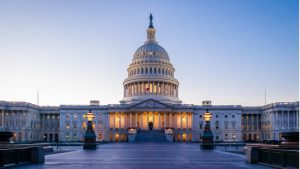Idaho Gov. Brad Little announced the formation of the Governor’s Cybersecurity Task Force, which is tasked with providing recommendations to improve business, government, and personal cybersecurity defenses and enhance the educational pipeline for cybersecurity workforce needs. The task force will also identify cybersecurity assets, resources, and public-private partnerships across Idaho.
The Colorado Smart Cities Alliance (the Alliance) announced a partnership with the University of Colorado Denver (CU Denver) that will look to aid the growth of smart cities by providing communities across the state access to new technologies, according to a press release.
Infrastructure week finally arrived in Washington, D.C. with the Senate’s approval of the $1 trillion Infrastructure Investment and Jobs Act on Tuesday morning. The bill – whose main tech-related titles include $65 billion for broadband and around $2 billion for cybersecurity – cleared the Senate by a vote of 69-30.
During its annual cybersecurity inspection, the University of Kentucky (UK) discovered a website vulnerability that allowed an unauthorized individual to likely acquire a copy of a College of Education database. As a result of the vulnerability, UK has pledged to add additional security measures.
Following a pair of votes on the Infrastructure Investment and Jobs Act over the weekend, the bipartisan infrastructure measure is nearing the finish line in the Senate. The bill is currently on track for a final vote in the Senate on Tuesday morning.
The Cybersecurity and Infrastructure Security Agency (CISA) released a new training guide to help IT professionals advance their careers in the Federal and state, local, tribal, and territorial cybersecurity communities.
A bipartisan bill introduced by Sens. Brian Schatz, D-Hawaii, Thom Tillis, R-N.C., John Cornyn, R-Texas, and Richard Blumenthal, D-Conn., seeks to improve cybercrime data collection and give Federal law enforcement more tools to stop online crime.
The Senate Committee on Commerce, Science, and Transportation approved two bills during an Aug. 4 business meeting, one to ensure that the Federal Communications Commission does not approve radio frequency devices that pose a national security risk, and another to advance the adoption of composite technology.
The Senate Committee on Homeland Security and Governmental Affairs advanced the State and Local Government Cybersecurity Act during an August 4 business meeting, sending the bill to the Senate floor for a vote.
The Toombs County School District, Ga., has launched a new digital learning platform ahead of the new school year. The school district partnered with Discovery Education to provide K-12 teachers and students access to a digital learning platform that provides access to resources in all subjects at home and in the classroom.












